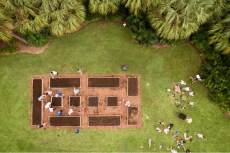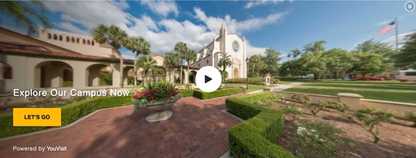Wild Wonders
Service and adventure converge on an Immersion experience in the Everglades, where hands-on learning leads to lasting impact.
By Elsa Wenzel
July 07, 2020

Last fall’s Everglades Immersion was one of 21 service learning experiences that took place in the 2019-20 academic year during which 294 Tars contributed more than 2,500 hours of service to 25 nonprofit community partners across the country.
During these one-of-a-kind Immersions organized by the Center for Leadership & Community Engagement, Rollins students have the opportunity to engage cultural, environmental, social, and political issues right at the source during weekend and sometimes weeklong journeys of education, reflection, and action. Through direct community engagement and leadership development, these experiences show students firsthand the commitment it takes to effect real change in the world and the true responsibility of active citizenship.

The Scoop
On a perfect Florida fall weekend, a group of 13 Rollins students embarked on four days of outdoor service in the Everglades. At nearly 8,000 square miles, the Everglades is the largest subtropical wilderness in the nation, and this epic outdoor classroom is located just a five-hour drive from campus.
Students worked alongside local environmental organizations, receiving an immersive education from animal keepers and park rangers about the challenges within this unparalleled ecosystem, which is one of only three places on the planet to be designated a World Heritage Site, a Wetland of International Importance, and an International Biosphere Reserve.



Volunteer work began at the nonprofit Everglades Outpost, which rescues and cares for injured or at-risk animals and rehabilitates them for their return to the wild. Among the wildlife students encountered were wolves, a zebra, a python, and a leopard, and they bonded over downright dirty work, clearing wildlife pens and sorting meat for the wolves.
“Service can be hard to predict,” says Sadie Machi ’21, a psychology major and Immersion co-facilitator. “I saw the importance of being a servant for the people you’re helping and doing whatever needs to be done, whether it’s just cleaning bowls from the enclosures animals are in, or something else.”
The students later took an airboat ride through the Everglades, spotting alligators and learning about how pythons and other invasive species are changing the landscape: When a python battles a native alligator, the snake usually wins.

Environmental studies professor Emily Nodine provided lessons about the subtropical wilderness she has studied intensely, including threats to it from invasive species, pollution, and climate change.
Next, the students traveled to Everglades National Park, where a ranger passed out tools and gloves, pointed out poison ivy, and set them to work clearing a trail that hadn’t been touched in a couple of years.
“She made it clear that our goal is to make it look like nothing had been done so we didn’t cut away anything unnecessary,” says Machi. “That was rewarding—afterward we were able to see that if someone was in a wheelchair, they could get through.”

Biggest Takeaways
“Part of being a global citizen today is understanding the environmental issues and your impact on the world because what we do here impacts people in other parts of the planet,” says environmental studies major Julia Taylor ’23. “Going to the Everglades and experiencing the beauty of the natural world firsthand is a friendly reminder that you have to respect it.”
Anecia Inbornone ’22, a psychology major, Bonner Leader, and Immersion co-facilitator, was also struck by how untouched parts of the Everglades appear and imagined how slowing down urban development could help with preservation.

Revelations such as those don’t come easily without being exposed to an ecosystem in person, notes Nodine. “Teaching about the Everglades ecosystem all semester long, I find myself saying over and over again, ‘You’ll see when you get there,’” she says. “Seeing one of Florida’s unique systems right out of the gate, you have that baseline knowledge as a springboard to learn about other kinds of systems.”
Machi appreciated how the diverse group of adventurers reached the same conclusion about how critical individual actions are for protecting nature.
“At our last reflection, we all agreed the most important thing we learned during this experience was educating people to be more aware of how everything we do has an impact,” she says. “Litter and fertilizer can flow all the way from Central Florida down to the Everglades.”

Foundation for Success
Rollins’ Immersion program—particularly the Everglades Immersion, which the College has offered for nearly 10 years—laid the foundation for Bethany Eriksen ’15’s trajectory at Rollins and her current career as education coordinator for animals, science, and environment at Disney World.
“This experience not only helped solidify my decision to pursue an environmental studies major at Rollins, but also inspired me to become more deeply involved with the Immersion program during all my four years at Rollins,” says Eriksen, who became an Immersion student leader and oversaw the development of more than 20 service-learning experiences for other students.
“Without a doubt, the skills I learned from participating in and coordinating Immersions rise to the top as the most important skills I now use in my professional career every day—from organizational skills like project management to collaboration, communication, and the importance of examining all sides of an issue and listening to all perspectives within a community,” says Eriksen.

Liberal Arts in Action
From community engagement and internships to study abroad and collaborative research, Rollins students put their know-how to work in the world through an array of hands-on experiences.
Put Your Education into Action
- Categories:
- Center for Leadership & Community Engagement |
- Psychology |
- Environmental Studies |
- Bonner Leaders |
- Academics

A Campus Committed to Change
Rollins is one of just 46 colleges in the world to earn Ashoka U’s Changemaker Campus designation, which recognizes the leading institutions in social innovation and changemaking.
Explore Our Changemaking CampusRecent Stories
December 16, 2025
From Rollins to Broadway
Juan Carlos ’23, who plays Bob Newby in the Broadway production of Stranger Things: The First Shadow, returned to campus to share what he’s learned on his journey from Rollins to theatre’s biggest stage.
December 15, 2025
Video: Rollins College Sneak Peek
From lakeside classrooms to vibrant student spaces, see where curiosity, community, and opportunity come together.
December 15, 2025
What It’s Like ... to Plan One of the World’s Biggest Events
Fueled by the endurance and adaptability she built at Rollins, Morgan Colley ’17 is helping bring the 2026 FIFA World Cup to life on the world’s biggest stage.

